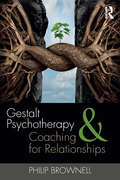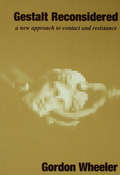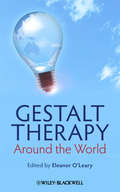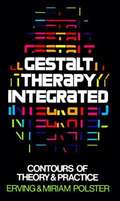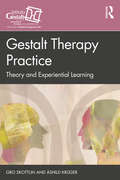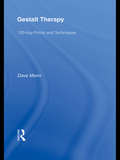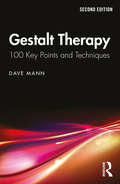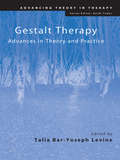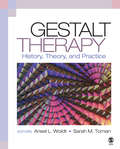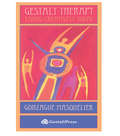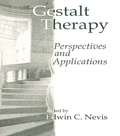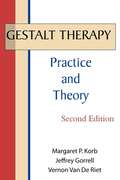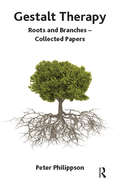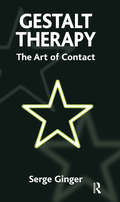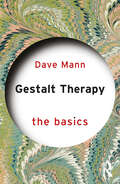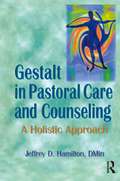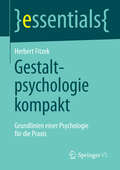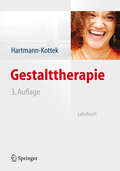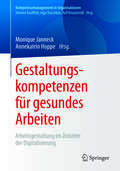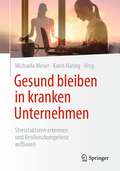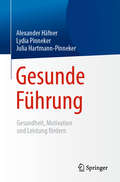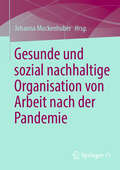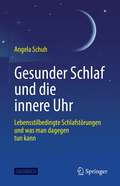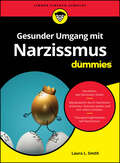- Table View
- List View
Gestalt Psychotherapy and Coaching for Relationships
by Philip BrownellGestalt Psychotherapy and Coaching for Relationships provides psychotherapists and coaches with a thorough understanding of two-person dynamics and offers practical interventions for working with couples and with two-person teams within larger organizations. Part I of this text relates contemporary gestalt therapy theory and gestalt-based coaching to developments in phenomenology, hermeneutics, cognitive science, extended cognition, embodiment, and kinesthesiology. Through a variety of narratives, Part II builds upon these themes and examines issues that typically emerge during couples work, including infidelity, provocative language, asymmetric relationships, sex, the use of emotion, limits and boundaries, and spirituality. Also included are general strategies for assimilating coaching into psychotherapy and vice versa, as well as recommendations for further study.
Gestalt Reconsidered: A New Approach to Contact and Resistance
by Gordon WheelerIn this original and penetrating work, the origins of the Gestalt psychotherapy model are traced back to its roots in psychoanalysis and Gestalt cognitive and perceptual psychology. Drawing new implications for both Gestalt and psychotherapy in general from these origins - and with special emphasis on the neglected work of Lewis and Goldstein - Wheeler develops a revised model that is more fully "Gestalt" and at the same time more firmly grounded in the spectrum of tools and approaches available to the contemporary psychotherapist. Along the way, a number of new insights are offered, not just in Gestalt, but in the working of the psychoanalytic and cognitive/behavioral models. The result is an integrated approach giving a fresh perspective on the universal processes of contact and resistance, both in psychotherapy and in social systems in general. The practitioner is given these tools for "addressing problems at the intra- and interpersonal level and wider systematic levels at the same time, and in the same language." Each chapter stands alone, and makes a fresh and significant contribution to its particular subject. Taken together, they constitute a remarkable excursion through the history of psychotherapy in this century, weaving powerfully through social psychology, behaviorism, and Gestalt itself, yielding a masterful new synthesis that will interest the practitioners of Gestalt and other schools alike.
Gestalt Therapy Around the World
by Eleanor O'LearyThe first internationally focused book on gestalt therapy to provide a comprehensive overview of current practice around the world. Features coverage of the history, training, theoretical contributions, and research initiatives relating to gestalt therapy in seventeen countries Points to future directions and challenges Includes extensive information on worldwide gestalt associations, institutes, and professional societies that promote the development of the approach
Gestalt Therapy Integrated: Contours of Theory and Practice
by Erving Polster and Miriam PolsterExplains the fundamentals of the behavioral theory that is based on an integrated view of the personality. For the student and the professional.
Gestalt Therapy Practice: Theory and Experiential Learning (Gestalt Therapy Book Series)
by Gro Skottun Åshild KrügerThis essential new book gives the reader an introduction to the fundamental concepts of gestalt therapy in a stimulating and accessible style. It supports the study and practice of gestalt therapy for clinicians of all backgrounds, reflecting a practice-based pedagogy that emphasises experiential learning. The content in this book builds on the curriculum taught at the Norwegian Gestalt Institute University College (NGI). The material is divided into four main sections. In the first section, the theoretical basis for gestalt therapy is presented with references to gestalt psychology, field theory, phenomenology, and existential philosophy. In the later parts, central theoretical terms and practical models are discussed, such as the paradoxical theory of change, creative adjustment, self, contact, contact forms, awareness, polarities, and process models. Clinical examples illustrate the therapy form’s emphasis on the relational meeting between therapist and client. Detailed description of gestalt therapy theory from the time of the gestalt psychologists to today, with abundant examples from clinical practice, distinguishes this book from other texts. It will be of great value to therapists, coaches, and students of gestalt therapy.
Gestalt Therapy: 100 Key Points and Techniques (100 Key Points)
by Dave MannGestalt therapy offers a present-focused, relational approach, central to which is the fundamental belief that the client knows the best way of adjusting to their situation. By working to heighten awareness through dialogue and creative experimentation, gestalt therapists create the conditions for a client's personal journey to health. Gestalt Therapy: 100 Key Points and Techniques provides a concise guide to this flexible and far-reaching approach. Topics discussed include: the theoretical assumptions underpinning gestalt therapy gestalt assessment and process diagnosis field theory, phenomenology and dialogue ethics and values evaluation and research. As such this book will be essential reading for gestalt trainees, as well as all counsellors and psychotherapists wanting to learn more about the gestalt approach.
Gestalt Therapy: 100 Key Points and Techniques (100 Key Points)
by Dave MannGestalt therapy offers a present-focused, relational approach, central to which is the fundamental belief that the client knows the best way of adjusting to their situation. This new edition of Gestalt Therapy: 100 Key Points and Techniques provides a concise, accessible guide to this flexible and far-reaching approach. Substantially updated throughout, topics discussed include: the theoretical assumptions underpinning gestalt therapy gestalt assessment and process diagnosis field theory, phenomenology and dialogue ethics and values evaluation and research. As such this book will be essential reading for gestalt trainees, as well as all counsellors and psychotherapists wanting to learn more about the gestalt approach.
Gestalt Therapy: Advances in Theory and Practice (Advancing Theory in Therapy)
by Talia Bar-Yoseph LevineThe Gestalt approach is based on the philosophy that the human being is born with the healthy ability to regulate needs and wants in relationship with the environment in which she/he lives. Heightening of personal awareness and exploration of needs is enabled by the therapist who actively engages in supporting and assisting the therapeutic journey of the client. Gestalt Therapy: Advances in Theory and Practice is a collaboration of some of the best thinkers in the Gestalt therapy approach. It offers a summary of recent advances in theory and practice, and novel ideas for future development. Each chapter focuses on a different element of the Gestalt approach and, with contributors from around the world, each offers a different perspective of its ongoing evolution in relation to politics, religion and philosophy. Incorporating ideas about community, field theory, family and couple therapy, politics and spirituality, this book will be of interest not only to Gestalt therapists but also to non-Gestalt practitioners, counsellors, psychologists, psychiatrists and other mental health professionals. Counselling, behavioural science and psychotherapy students will also find this a valuable contribution to their learning.
Gestalt Therapy: History, Theory, and Practice
by Dr Ansel L. Woldt Dr Sarah M. TomanGestalt Therapy: History, Theory, and Practice is an introductory text, written by major Gestalt theorists, that will engage those new to Gestalt therapy. Editors Ansel Woldt and Sarah M. Toman introduce the historical underpinnings and fundamental concepts of Gestalt therapy and illustrate applications of those concepts to therapeutic practice. The book is unique in that it is the first Gestalt text specifically designed for the academic and training institute settings. Gestalt Therapy takes both a conceptual and a practical approach to examining classic and cutting-edge constructs.
Gestalt Therapy: Living Creatively Today
by Gonzague MasquelierHow can we reconcile our desire for freedom with the limits or routines that orgainize our existence? How do we affirm our personality while adjusting to the world? How can we be nourished by exchanges with others without losing our autonomy? Gestalt Therapy responds to these essential questions of our daily lives. An important branch of humanistic psychology, Gestalt Therapy emphasizes the importance of communication and contact, the ways that we maintain relationships with ourselves, others and our environment. It helps individuals to develop potential by going beyond rigid patterns and to finally become creators of their own existence, each of us creating our own life rather than merely submitting to it. Gonzague Masquelier presents the history of fifty years of the Gestalt movement as well as its development in today's world. He begins with the story of its founders: Laura and Fritz Perls, and their associate, Paul Goodman. He explains how this unique therapeutic path developed little by little, through the meeting of European existentialism with American pragmatism. Then, he clearly explains the principal concepts which form the basis of this approach, illustrated by numerous clinical examples taken from his own professional experience. Finally, the author reviews the current areas of practice of the Gestalt approach: not only individual or group psychotherapy, but also within organizations, executive board rooms and the training professions. He offers an excellent synthesis of differing aspects of this important perspective within the field of psychology today.
Gestalt Therapy: Perspectives and Applications
by Edwin C. NevisGestalt Therapy: Perspectives and Applications is a classic text which, when it was first released in 1992, signaled a renaissance of Gestalt scholarship throughout the world. In this volume, Edwin Nevis, one of the foremost Gestalt writers, thinkers, and practitioners of the last 40 years, skillfully draws together a diverse selection of essays from Gestalt therapists of every persuasion, united here by the clarity of their thought, and the constancy of commitment to the development and extension of the Gestalt model. Here you will find one of the finest overviews of classical Gestalt therapy theory and practice available: groundbreaking essays on such topics as diagnosis and ethics from a Gestalt perspective, and an assortment of pragmatic clinical essays of immediate value to the working practitioner.
Gestalt Therapy: Practice and Theory
by Margaret P. Korb Jeffrey Gorrell Vernon Van De RietAn outstanding overview of Gestalt theory and practice -- from the history of its philosophical development to current trends in its theoretical explorations and clinical applications. An essential text. Gestalt Therapy Practice and Theory includes comprehensive subject and author indexes and the most up-to-date selection of references available.
Gestalt Therapy: Roots and Branches - Collected Papers
by Peter PhilippsonThis book is a collection of articles written in the period 1985–2011. The articles form a background for perspectives that concern the foundations of Gestalt therapy: foundations in philosophy and foundations in psychoanalysis and connections with other therapeutic theories.
Gestalt Therapy: The Art of Contact
by Serge GingerGestalt Therapy has been developing steadily for the last 50 years, in America as well as in Europe. It is cureently practieed in diffeeent eettings: individual, group, and family therapies; personal growth; social, medical and business organizations.
Gestalt Therapy: The Basics (The Basics)
by Dave MannGestalt Therapy: The Basics provides an accessible and concise overview of the approach and its substantial theory.Experiential exercises, clinical vignettes and examples from everyday practice are included to enrich understanding of gestalt’s theory and its clinical application. This book explores: the history of gestalt therapy, gestalt maps, philosophical beliefs, creative experimentation and ethical considerations. Useful chapter summaries are featured throughout to aid comprehension.This book is essential reading for gestalt trainees, as well as counsellors and psychotherapists wanting to learn more about the gestalt approach.
Gestalt in Pastoral Care and Counseling: A Holistic Approach
by Jeffrey D HamiltonGestalt in Pastoral Care and Counseling is the only book to provide you with an integrated model of pastoral care and counseling from the perspective of Gestalt theory. Covering all aspects of ministry, including visitation, counseling, worship, and administration, it is a valuable text for advanced undergraduate or graduate classes and small group or individual study for seminaries, church ministries, pastoral counseling training programs, and lay pastoral ministry programs. This book will increase your confidence in your work, help you understand blockages as well as avenues of change, and lead you to a more creative, yet consistent, stance in your ministry.Gestalt in Pastoral Care and Counseling makes clear that all of ministry is, in fact, pastoral in nature. It demonstrates the principles of Gestalt in pastoral ministry in a gradual manner, true to both Gestalt principles and your needs. Some of the topics you learn about include: key elements of Gestalt theory, from the early developers through more recent practices the cycle of experience--a model that provides an understanding of the various steps involved in change on all levels Gestalt applications in pastoral counseling, worship, and administration a theology of pastoral caring--a model for pastoral ministry based on the relational aspects of the Biblical narrative and its application in ministry ideas for continued growth based on daily life experienceWith well-developed presentations of Gestalt principles and pastoral ministry, Gestalt in Pastoral Care and Counseling provides you with a new perspective on the meaning of pastoral ministry. Not only will you learn new skills, you will also develop a new appreciation for what can occur within pastoral relationships. The theoretical basis of Gestalt embraces the whole of life experience as part of the process of change and growth and holds sacred the relationship that exists between persons. As your understanding and use of these principles increases, the quality of care and counseling you provide in your ministry will continue to improve.
Gestaltpsychologie kompakt: Grundlinien einer Psychologie für die Praxis (essentials)
by Herbert FitzekDie Gestaltpsychologie wurde vor 100 Jahren entwickelt, um die akademische Psychologie für die Fragen der Praxis an die Wissenschaft vom Erleben und Verhalten öffnen: Wie kommt es, dass sich aus der Vielfalt von Eindrücken Erfahrungen bilden? Wie kommen wir zu Problemlösungen? Wie werden Spannungen abgebaut? Was bestimmt unser Handeln? Daraus wurde ein Konzept, das komplexe Wirkungszusammenhänge von einem einheitlichen Denksystem darstellen kann: der Analyse des im aktuellen psychischen Feld konkret Wirkenden und Sinnmachenden. Heute ist die Gestaltpsychologie präsent in der Psychotherapie, in der Wirtschafts- und Kulturpsychologie wie auch im interdisziplinären Diskurs des systemischen Denkens, der Organisationstheorie und der Wirtschaftsästhetik. Im Buch wird das Konzept in seiner historischen Entwicklung vorgestellt und mit den Fragen konfrontiert, denen sich eine praxistaugliche und ,,praktische Theorie" stellen muss.
Gestalttherapie
by Lotte Hartmann-Kottek Uwe StrümpfelAls psychotherapeutisches Verfahren fasziniert die Gestalttherapie durch ihr unmittelbares, erlebnisorientiertes Vorgehen. In dem Band stellt die Autorin den Ansatz systematisch und zugleich praxisnah vor: Die theoretischen Grundlagen werden erläutert, Ergebnisse der Wirksamkeitsforschung diskutiert und die Anwendung der Methoden anhand von Fallbeispiele demonstriert. Dabei finden unterschiedliche Anwendungsbereiche und Settings wie Einzel- und Gruppentherapie, Familienaufstellungen oder Gestalttherapie für Kinder und Jugendliche Berücksichtigung.
Gestaltungskompetenzen für gesundes Arbeiten
by Monique Janneck Annekatrin HoppeDieses Buch beschreibt Ansätze, Arbeit in Zeiten der Digitalisierung, komplexer Umwelten und des demografischen Wandels so zu gestalten, dass die Ziele der Organisation, die Arbeitsaufgaben und die Bedürfnisse der einzelnen Mitarbeiter/-innen in Einklang gebracht werden: Durch die Möglichkeit individueller Gestaltungskompetenz. Denn nur wenn Arbeit Gestaltungsspielraum bietet und zu den Zielen, Stärken und Leidenschaften der Mitarbeitenden passt, können diese gesund bleiben und zu den Organisationszielen langfristig beitragen. Im vorliegenden Band werden Konzepte und Maßnahmen zur Förderung von Gestaltungskompetenzen vorgestellt – in großen Unternehmen sowie auch für Selbständige.
Gesture: Visible Action as Utterance
by Adam KendonGesture, or visible bodily action intimately involved in the activity of speaking, has long fascinated scholars and laymen alike. Written by a leading authority on the subject, this book draws on the analysis of everyday conversations to demonstrate the varied role of gestures in the construction of utterances. Publication of this definitive account of the topic marks a major development in semiotics as well as in the emerging field of gesture studies.
Gesund bleiben in kranken Unternehmen: Stressfaktoren erkennen und Resilienzkompetenz aufbauen
by Michaela Moser Karin HäringResilienz ist in der Arbeitswelt ein zentraler Schutzfaktor im Umgang mit Stress. Dennoch liegen nur wenige gesicherte Erkenntnisse über die psychische Gesundheit von Fach- und Führungskräften vor, die sich in einem krankmachenden Unternehmensumfeld bewegen. Unternehmen können als kranke Systeme bezeichnet werden, wenn zwischen der Organisation und ihren Mitgliedern toxische Verbindungen auf der Führungs-, Kollegen- und Gruppenebene entstehen. Das Buch stellt daher die Frage in den Vordergrund, an welchen Merkmalen kranke Unternehmenssysteme erkannt werden können und welche Maßnahmen der Einzelne ergreifen kann, um Schutzfaktoren aufzubauen und seine Resilienz zu stärken.
Gesunde Führung: Gesundheit, Motivation und Leistung fördern
by Alexander Häfner Lydia Pinneker Julia Hartmann-PinnekerFragen auch Sie sich, wie Sie als Führungskraft sowohl Mitarbeitergesundheit wie auch Arbeitszufriedenheit und Motivation erhalten und verbessern können?In diesem Buch finden Sie anregende Fragen, Fallbeispiele und Tipps für Ihren Führungsalltag. Psychologisch fundiert nutzen die Autoren ihren reichen Fundus an praktischen Erfahrungen in der Aus- und Weiterbildung von Führungskräften um Ihnen praxisnah alle wichtigen Aspekte gesunder Führung zu vermitteln.Sie lernen über den Einfluss grundlegender Haltungen und erfahren, warum Wertschätzung, Lösungsorientierung und Fairness ebenso wichtig sind, wie der Umgang mit Konflikten, die motivierende Aufgabengestaltung oder die Teamkoordination. Alle Inhalte drehen sich um gesundes Führungsverhalten und die Einstellungen und Sichtweisen dahinter. Dabei integriert gesunde Führung verschiedene Ansätze, die nicht nur für die Mitarbeiterzufriedenheit und -gesundheit hoch relevant sind, sondern generell gute Führung ausmachen.Die Zielgruppen:Dieses Buch richtet sich an alle Führungskräfte, die in ihren Teams Leistung auf gesunde Art und Weise fördern möchten.Auch HR-Verantwortliche, Trainer, Wirtschaftspsychologen, Personalentwickler, Mitarbeiter im Gesundheitsmanagement, Betriebsärzte und Betriebsräte werden von diesem Werk profitieren. Da es keine besonderen Fachkenntnisse voraussetzt, ist es für alle eine Bereicherung, die sich für Führung in Organisationen interessieren.
Gesunde und sozial nachhaltige Organisation von Arbeit nach der Pandemie
by Johanna MuckenhuberIn dem Band wird diskutiert, wie sich die Arbeitsorganisation im Verlauf der Covid-19-Pandemie verändert hat: Welche Aspekte hybrider und digitalisierter Arbeit längerfristig bestehen bleiben, wie sich diese auf die ArbeitnehmerInnen auswirken und wie diese nachhaltig im Sinne eines ganzheitlichen Gesundheitsbegriffs gestaltet werden können. Neben der konkreten Arbeitsorganisation werden dabei auch Aspekte sozialer Sicherheit im Spannungsfeld mit erhöhter Flexibilität in der Arbeitswelt analysiert.
Gesunder Schlaf und die innere Uhr: Lebensstilbedingte Schlafstörungen und was man dagegen tun kann
by Angela SchuhIn diesem Sachbuch erfahren Sie, warum guter, ausreichender und erholsamer Schlaf essenziell für Ihre Gesundheit ist. Zu wenig und schlechter Schlaf macht übergewichtig und krank. Aber jeder Zweite schläft nicht gut, unter den Erwerbstätigen in Deutschland schlafen sogar 80 % schlecht. Einer der wichtigsten Gründe für nicht organisch bedingte Schlafstörungen ist unser Lebensstil. Wir sind komplexen Belastungen in Arbeit und Privatem ausgesetzt. Und unser Umgang damit bewirkt phasenweise eine Störung der inneren Uhr (Chronobiologie). Folge: zunächst Schlafprobleme, psychische Belastung, akute oder chronische Erkrankungen. Dieses Buch befasst sich nicht nur mit den wissenschaftlichen Erkenntnissen, sondern gibt praktische und lebensnahe Anleitungen für einen guten und gesunden Schlaf. Fragen und Antworten aus dem Inhalt: Was passiert mit uns im Schlaf, und was bedeutet Schlaf für unsere Gesundheit? Wie hängen guter Schlaf und die innere Uhr zusammen? Was muss man beachten, um seine innere Uhr nicht zu stören? Welcher Lebensstil fördert gesunden Schlaf? Wie bereite ich mich auf den Schlaf vor? Was mache ich, wenn ich nicht einschlafen kann oder nachts aufwache? Über die Autorin: Prof. Dr. Dr. med. habil. Angela Schuh beforscht an der Ludwig-Maximilians-Universität München die Zusammenhänge von Lebensstil, Gesundheit und Schlaf und zeigt: Guter und ausreichender Schlaf ist machbar.
Gesunder Umgang mit Narzissmus für Dummies (Für Dummies)
by Laura L. SmithGroßartig – leider oft auf Kosten anderer Narzissten erscheinen anfangs oft charmant, doch Partner, Freunde, Arbeitskollegen oder Familienmitglieder leiden oft unter diesen sehr speziellen Persönlichkeiten. Vermuten Sie, dass Sie selbst oder jemand in Ihrem Leben ein Narzisst ist, und möchten mehr darüber erfahren, wie Narzissten ticken? Laura L. Smith stellt typische Verhaltensweisen von Narzissten vor und erläutert die Warnzeichen, auf die Sie achten sollten. Sie bekommen Tipps, wie Sie sich vor narzisstischer Manipulation schützen können. Das Buch hilft Ihnen, sich aus narzisstischen Verstrickungen zu lösen, und erklärt die Möglichkeiten, wie Narzissmus behandelt werden kann. Sie erfahren Wie ein Mensch zum Narzissten wird Wie Sie im Umgang mit Narzissten Ihren eigenen Selbstwert bewahren können Wie Sie sich aus den Fängen von Narzissten befreien können Wie Psychotherapie bei Narzissmus hilft
